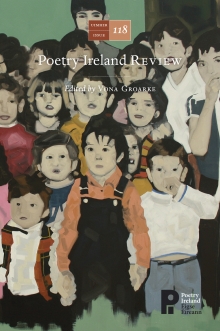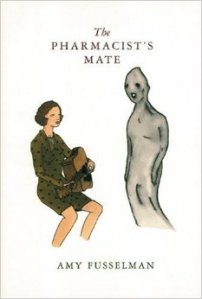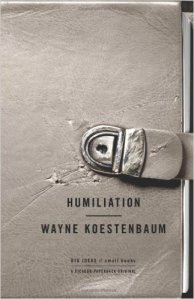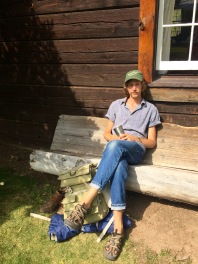
There’s just a few weeks of summer fun left, and the Rio Olympics are underway! The beginning of a school year is upon us but there’s still some time left to spend with some great books this August! So here are some recommendations from the Cambridge Writers’ Workshop on what to read before hanging up the surfboard and headin’ on home 😉 Thanks to Anna-Celestrya Carr, Alex Carrigan, AM Ringwalt, David Shields, Emily Smith, and Laura van den Berg for their wonderful recommendations below!
–Alex Carrigan (Curator)
 Station Eleven by Emily St. John Mandel
Station Eleven by Emily St. John Mandel
(Recommended by Anna-Celestrya Carr)
Station Eleven is captivating and beautiful in a subtle way. I’m known to read the last page first of any book I pick up. I like having an idea of where a story is going to go. For this book I resisted looking ahead. I found myself enthralled and surprised the entire time. Dystopian fiction has become one of my favorite genres and Station Eleven stands out in its category.
The novel opens with a famous actor having a heart attack and dying on stage while playing King Lear. That same night, there is a massive outbreak of a deadly virus called the Georgia Flu, and within weeks, 99 percent of the world’s population is wiped out. In a world decimated by a global pandemic, where the few survivors live in scattered communities without electricity, the Traveling Symphony goes from town to town in the Great Lakes region, performing Shakespeare and classical music. The story plays around with time and perspective, jumping back and forth between After the Collapse and Before the Collapse. We circle around different characters’ lives and sometimes see the same scene from a different person’s view. A gorgeous read.
 The Girl on the Train by Paula Hawkins
The Girl on the Train by Paula Hawkins
(Recommended by Alex Carrigan)
Gillian Flynn’s Gone Girl is one of my favorite recent “popular” books, and a book that helped remind me how much I love modern mysteries. I heard that The Girl on the Train was similar to Gone Girl, so I checked it out. What I found was a mystery novel I had to read in one sitting, causing me to spend nearly four hours in a cafe reading the entire book one rainy Sunday afternoon. The novel follows a woman named Rachel, an unemployed, alcoholic, divorcee, who spends her train rides fantasizing about what she thinks is the perfect couple living in one house along the tracks. When the woman of the couple goes missing, Rachel discovers that she has a connection to the mystery, and through her interference comes to confront her personal demons and sees how dangerous her involvement is. Hawkins makes a very flawed and relatable protagonist in Rachel, and creates a mystery that, while maybe not the most unique, is still quite thrilling to read, and only leaves me excited for the film adaptation coming out this year.
 The Disaster Artist: My Life Inside The Room,
The Disaster Artist: My Life Inside The Room,
The Greatest Bad Movie Ever by Greg Sestero, and Tom Bissell
(Recommended by Alex Carrigan)
Tommy Wiseau’s The Room is one of the worst movies ever made, but has one of the most devoted fan followings ever due to how hilariously awful the film is. The Disaster Artist, co-written by one of the leads in the film (Sestero), is a tell-all that reveals how the film was made and goes into the bizarre culture surrounding it. What follows is a book that veers from painfully hilarious to just plain painful. At the heart of the story is the odd friendship between Sestero and Wiseau, which paints Wiseau as a creep, a fool, a dreamer, an enigma, an entrepreneur, and an artist all at once. What could be a book that exists to bash Wiseau for his egomania, his misogyny, and his deep misunderstanding of how to act as a person is instead a book about art itself. It shows that even the people who make bad movies are sympathetic and have dreams they want to fulfill, even if they aren’t very good at it. The books shows that everyone involved in The Room (except for maybe Wiseau depending on how you read him) deserved better, and is quite enjoyable to read after seeing the movie. It shows that even misguided passion projects can still create beautiful, inexplicable, and valued art despite every possible obstacle in the way.
 Everything I Never Told You by Celeste Ng
Everything I Never Told You by Celeste Ng
(Recommended by Alex Carrigan)
Most stories that deal with mysterious deaths focus on the mystery and the investigation, but often don’t focus on the impact the death has on the victim’s family. Celeste Ng’s debut novel Everything I Never Told You follows a Chinese-American family in 1977 after their daughter is found dead in a lake. What could be a Twin Peaks-esque mystery is instead a meditation on race, gender, and loss. By focusing on a mixed race family in a small town during the late ’70’s, Ng shows how the era played into the attitudes of the characters, from the father who tries to downplay his Chinese heritage and blend in, to the mom who wants nothing more than to ensure her daughter doesn’t fall into the same mistakes she made. At the heart is the dead girl, Lydia, and it’s through her death and the time leading up to it that the reader realizes that what doesn’t matter is why or how Lydia died, but rather what her death reveals about the family and the time they lived in.
 Americanah by Chimamanda Ngozi Adichie
Americanah by Chimamanda Ngozi Adichie
(Recommended by Alex Carrigan)
When my brother read Americanah, he said Nigerian author Chimamanda Ngozi Adichie instantly became his favorite living writer. I recently picked up the book, and I found that he was completely justified in believing that. Americanah follows two young Nigerians, Ifemelu and Obinze, and they grow up in Nigeria and move on with their adult lives. Ifemelu travels to America for college and starts a successful blog dealing with her facing race for the first time in her life. Obinze becomes an undocumented worker in England, and his story provides a contrast to Ifemelu, who flourishes in her new environment while he finds it difficult to settle into the first world. The book taught me a lot about Nigeria in the 90’s and 00’s, and is a really good book for dealing with race relations, primarily for how non-American blacks deal with race. Adichie imbues her characters with such spirit and detailed voice that it becomes easy to see them as real people, so I have found her an author I really want to read more of in the future.
 A Public Space: Issue 24
A Public Space: Issue 24
(Recommended by AM Ringwalt)
This issue of A Public Space focuses on artists creating outside of their primary mediums; Etel Adnan writes in epistolary prose about weaving and David Lynch is interviewed about his paintings. A devoted Adnan fan, I excitedly picked up this issue to absorb more of her voice. As she shares images of trees “yellow, but haloed” . . . “still [with] a green heart and golden edges, such tender vegetal icons,” I realized that summer is the time of weaving–gathering light–before colder seasons and a scarcity of unburdened hours.
 Poetry Ireland Review Issue 118: The Rising Generation
Poetry Ireland Review Issue 118: The Rising Generation
(Recommended by AM Ringwalt)
In early 2016, I lived in Dublin and worked as an intern at the Irish Writers’ Centre. While there, I fell in love with its myriad journals (Guts and Gorse to name a few). While journals with names like Poetry Ireland Review connote tradition–and thus old white men–I never read a copy until I saw their Rising Generation issue, published in sync with the centenary of the 1916 Rising. Honoring “rising” poets (new and successful in the field, not necessarily young), this issue highlights poets including Jessica Traynor (of the Centre’s A Poet’s Rising) and provides accompanying questionnaires, prompting its featured poets to extrapolate on ideas such as: “Would you rather be the poet or the poem?”
 A Year with Hafiz: Daily Contemplations
A Year with Hafiz: Daily Contemplations
by Hafiz and Daniel Ladinsky
(Recommended by AM Ringwalt)
I first saw A Year with Hafiz on Ariana Reines’ Tumblr. Always spiritual, always prophetic, her website is a well of meditation and insight. (A recent post highlights Muhyiddin Ibn ’Arabi’s “Our heart holds within it all forms, that our hearts created. We have made a meadow there for gazelles, children, music, dance and dreams.”) Immediately after reading Reines’ chosen excerpt, I ordered a used copy of A Year with Hafiz online. Though a devotional style book isn’t necessary to read one Hafiz poem a day, the book itself is beautiful and compiles Hafiz’s writing in a way that compliments the changing months and seasons. Starting this “devotional” in the summer has allowed me to more deliberately meditate on certain phrases each day with the freedom inherent in the season. Take May 25, for example, as a preface to the summer: “Like a great starving beast my body / is quivering, fixed on the scent of light.”
 The Poet, The Lion, Talking Pictures, El Farolito, A Wedding in St. Roch, The Big Box Store, The Warp in the Mirror, Spring, Midnights, Fire & All
The Poet, The Lion, Talking Pictures, El Farolito, A Wedding in St. Roch, The Big Box Store, The Warp in the Mirror, Spring, Midnights, Fire & All
by C.D. Wright
(Recommended by AM Ringwalt)
C.D. Wright, described by Ben Lerner as “an utterly original American artist,” is a bright angel reminding me, time and again, how the act of writing is the act of salvation. Writing, after all, is a saving force, one that evokes internal and external revolutions. Though I was never lucky enough to meet Wright, I felt her brightness near upon the publication of The Poet, The Lion, Talking Pictures, El Farolito, A Wedding in St. Roch, The Big Box Store, The Warp in the Mirror, Spring, Midnights, Fire & All. This book, with its multitudinous worlds (the first poem, among many others, is titled “In a Word, a World”) is a manifesto of the spiritual potency of poetry. This book, at home in her canon of nonconforming literature, is a call to push boundaries beyond experimentation and into innovation. The Poet, The Lion…, published very the month of Wright’s passing, is a reminder of mortality and, beyond life (and death), the endless power of poetry.
 Last Sext by Melissa Broder
Last Sext by Melissa Broder
(Recommended by AM Ringwalt)
I picked up a copy of Last Sext while on a date with my partner at the Harvard Bookstore last month. These dates always go the same–I say I won’t buy a single book and I leave with more than one. Always fodder for an empty wallet and, most importantly, for, at its best, transformative inspiration, I’m thankful that I found myself squatting in the poetry section absorbed in a copy of Broder’s book. I’ve never read a collection of poems containing cunnilingus, boring angels, clock-obsessed Americans, third eyes, centaurs, gypsies, “Me saying more and the light saying yes.” The intersections between dark and light, as they both illuminate sex, farting, hallucinating and “childhood feeling” (among countless other phenomena), remind me that darkness, too, can be an illuminating force. I urge you to read her poem “Salt,” published in Poetry in 2014. Then, I urge you to say more and get a copy or two or three of Last Sext.
 The Pharmacist’s Mate by Amy Fusselman
The Pharmacist’s Mate by Amy Fusselman
(Recommended by David Shields)
The book fluctuates wildly and unpredictably from Fusselman’s attempt to get pregnant through artificial means, her conversations with her dying father, and his WWII diary entries. I don’t know what the next paragraph will be, where Fusselman is going, until—in the final few paragraphs—she lands on the gossamer-thin difference between life and death, which is where she’s been focused all along, if I could only have seen it.
 Humiliation by Wayne Koestenbaum
Humiliation by Wayne Koestenbaum
(Recommended by David Shields)
Humiliation runs like a rash over the body of Koestenbaum’s work. Here he confronts the feeling directly and the result is an extraordinary meditation on—I don’t know how else to say it—the human condition.
 The Argonauts by Maggie Nelson
The Argonauts by Maggie Nelson
(Recommended by Emily Smith)
Maggie Nelson makes the public private in this genre-bending, poetic recollection of her pregnancy and husband Harry Dodge’s transition. Like her previous works, Nelson draws from critics like Judith Butler and Roland Barthes to explore her personal perspective on sexuality, gender, queer family making and the radical idea that motherhood never has to be equated with the loss of individual freedom.
 A Girl is a Half-Formed Thing by Elmear McBride
A Girl is a Half-Formed Thing by Elmear McBride
(Recommended by Emily Smith)
Although A Girl is a Half-Formed Thing was just recently published, it’s already been hailed as a classic. In this novel surrounding sexual abuse and a sister’s relation to her young brother diagnosed with cancer. Elmear McBride, who spent ten years trying to publish the novel, has been compared to James Joyce and Virginia Woolf for her experimental style, which has often been described as “electric.”
 Binary Star by Sarah Gerard
Binary Star by Sarah Gerard
(Recommended by Emily Smith)
Sarah Gerard’s Binary Star follows the story of an anorexic young woman and her neglectful, alcoholic boyfriend. The two feed off of each other’s negativity until taking a road trip and discovering vegananarchism. The short, lyrical novel tackles diet culture and the illness that, as a result, the two love to keep company. Like its title, the novel shines bright and fast, held together by its own gravity until its shocking, explosive end.
Heartbreaker by Maryse Meijer and Barefoot Dogs by Antonio Ruiz-Camacho
(Recommended by Laura van den Berg)


Heartbreaker is Maryse Meijer’s debut collection, with stories following a wide variety of characters as they deal with desire, vulnerability, sex, heartbreak, and survival. Barefoot Dogs is a series of connected stories about the members of a wealthy Mexican family after the patriarch goes missing. These collections are wildly different in style and approach, and are wildly successful in creating a singularly absorbing world for the reader to inhabit, from the first story to the last.

 Rita Banerjee is the Executive Creative Director of the Cambridge Writers’ Workshop and teaches at Rutgers University. She received her doctorate in Comparative Literature from Harvard and her MFA in Creative Writing from the University of Washington, and her writing appears in Poets & Writers, The Rumpus, Painted Bride Quarterly, Mass Poetry, Hyphen Magazine, Los Angeles Review of Books, Electric Literature, VIDA: Women in Literary Arts, AWP WC&C Quarterly, Queen Mob’s Tea House, Riot Grrrl Magazine, The Fiction Project, Objet d’Art, KBOO Radio’s APA Compass, and elsewhere. Her first collection of poems, Cracklers at Night (Finishing Line Press), received First Honorable Mention for Best Poetry Book of 2011-2012 at the Los Angeles Book Festival, and her novella, A Night with Kali, in Approaching Footsteps (Spider Road Press), released in November 2016. Her edited volume, CREDO: An Anthology of Manifestos and Sourcebook for Creative Writing, will release in March 2018. She is currently working on a novel, a book on South Asian literary modernisms, and a collection of lyric essays.
Rita Banerjee is the Executive Creative Director of the Cambridge Writers’ Workshop and teaches at Rutgers University. She received her doctorate in Comparative Literature from Harvard and her MFA in Creative Writing from the University of Washington, and her writing appears in Poets & Writers, The Rumpus, Painted Bride Quarterly, Mass Poetry, Hyphen Magazine, Los Angeles Review of Books, Electric Literature, VIDA: Women in Literary Arts, AWP WC&C Quarterly, Queen Mob’s Tea House, Riot Grrrl Magazine, The Fiction Project, Objet d’Art, KBOO Radio’s APA Compass, and elsewhere. Her first collection of poems, Cracklers at Night (Finishing Line Press), received First Honorable Mention for Best Poetry Book of 2011-2012 at the Los Angeles Book Festival, and her novella, A Night with Kali, in Approaching Footsteps (Spider Road Press), released in November 2016. Her edited volume, CREDO: An Anthology of Manifestos and Sourcebook for Creative Writing, will release in March 2018. She is currently working on a novel, a book on South Asian literary modernisms, and a collection of lyric essays. Parisian literary life and contemporary art & music laid the groundwork and inspiration for Sounds in Bloom, a poetry-music-movement-art ensemble co-founded by poet Diana Norma Szokolyai & saxophonist Dennis Shafer in 2006. The Boston Globe has called their work “avant-garde.” Originally participating in David Barne’s Spoken Word nights in Paris and featured by Paris Soirees Salons, Sounds in Bloom now performs in NY, Boston and & Paris. Some places they have performed include The Firehouse Space, Pete’s Candy Store, Barbès, The Boston Conservatory, The Outpost, Theatre Salle Edmond Michelet, and the Cité International des Arts.
Parisian literary life and contemporary art & music laid the groundwork and inspiration for Sounds in Bloom, a poetry-music-movement-art ensemble co-founded by poet Diana Norma Szokolyai & saxophonist Dennis Shafer in 2006. The Boston Globe has called their work “avant-garde.” Originally participating in David Barne’s Spoken Word nights in Paris and featured by Paris Soirees Salons, Sounds in Bloom now performs in NY, Boston and & Paris. Some places they have performed include The Firehouse Space, Pete’s Candy Store, Barbès, The Boston Conservatory, The Outpost, Theatre Salle Edmond Michelet, and the Cité International des Arts.









 The Plague of Doves
The Plague of Doves 
 Bad Feminist
Bad Feminist

 We Should All Be Feminists
We Should All Be Feminists The Man in the High Castle
The Man in the High Castle News From Nowhere
News From Nowhere It’s Not Easy Being Green: And Other Things to Consider
It’s Not Easy Being Green: And Other Things to Consider Queer: A Graphic History
Queer: A Graphic History




 Grant Writing & Programming Intern
Grant Writing & Programming Intern  Cambridge Writers’ Workshop Grant Writing & Programming Intern
Cambridge Writers’ Workshop Grant Writing & Programming Intern 













 Erica Buettner
Erica Buettner Elizabeth Devlin
Elizabeth Devlin






















